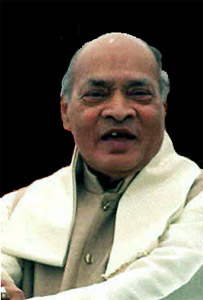Feb 22, 2026
Feb 22, 2026
India today is on a fast track to global power status and this is a fact that is conceded by the international community, even India's detractors. But as India basks in this glow have Indians ever paused to ponder as to which Indian Prime Minister placed India on this track, initially.
Some Indians would answer that it was Jawaharlal Nehru, others would say it was Indira Gandhi while others would suggest it was Rajiv Gandhi. All in all the answers would add up to maintaining that it was the Nehru-Gandhi dynasty that was responsible for doing so. The same impression gets reinforced when Congress posters and huge cutouts at Congress Party political jamborees project these beaming faces.
Very few Indians would think about India's first South Indian Prime Minister who really brought about the momentous reversal of the Congress Party's foreign and economic policies in a manner which induced international confidence that India was ready to shed its obsessive shackles of a non-alignment foreign policy and a socialist state-controlled economy. Both these features were a hallmark of the Nehruvian dynasty. Both these policies held back the more powerful members of the international community from assisting India's achievement of its national aspirations, which ordinarily they would have been inclined to do so.
Long years of watching the Indian political scene had convinced me that it would have to be a South Indian Prime Minister who would be able to break out from the Congress Party's foreign policy and economic policy which had long prevailed under dynastic Prime Ministers.
 A South Indian Prime Minister appeared in the person of P.V. Narasimha Rao emerged in the early 1990s in the void created by Rajiv Gandhi's assassination. Rao was picked while on his way out to political retirement by Congress Party managers, ostensibly as a stop gap measure till such time the dynasty could revert back to Prime Ministership. Little did they realize that what they perceived as a rootless political entity would eventually put India on the trajectory to great power status and eclipse his more so-perceived illustrious predecessors from the Congress Party.
A South Indian Prime Minister appeared in the person of P.V. Narasimha Rao emerged in the early 1990s in the void created by Rajiv Gandhi's assassination. Rao was picked while on his way out to political retirement by Congress Party managers, ostensibly as a stop gap measure till such time the dynasty could revert back to Prime Ministership. Little did they realize that what they perceived as a rootless political entity would eventually put India on the trajectory to great power status and eclipse his more so-perceived illustrious predecessors from the Congress Party.
During his tenure as Prime Minister, Rao reversed India's foreign and economic policies to strike appropriate equations with the new international order emerging rather than clinging to outdated political philosophies. This required great boldness and courage of conviction to reverse the hallowed policies of the Congress Party which brought him into office.
Some of his most impressive achievements which deserve to be recalled are as follows:
Initiating India's economic reforms and market liberalization policies which today provide the mainstay of India's sustained high rates of economic growth which provide an index of India's power potential.
Rao was the real architect of the transformation of the Indian economy and not Dr Manmohan Singh as now widely claimed. Rao provided the bold political decision and Dr Singh as his Finance Minister translated them into policies.
India's new 'Look East' foreign policy was a Rao creation to integrate India with the vibrant economies of East Asia and South East Asia. It is today paying both economic and political dividends.
The India-Israel strategic partnership was given its initial impetus by Rao. The dividends were visible during the Kargil War. It's present dilution by the present Congress Government has enabled Pakistan to open up to Israel for the first time.
Rao reclaimed Myanmar from a Chinese strategic embrace brought about by the 'democracy crusades ' of his predecessors.
India's improved relations with the United States were brought about in Rao's tenure and so also with China with border CBMs.
If information leakage had not taken place Rao was well on the way to carry out nuclear weapons tests during his tenure.
India's main determinants of its foreign policy should rest on the two determinants of hard core national security interests and economic security interests and not on idealism as was the case hither-to-fore. Rao distinguished himself in achieving these objectives. This has to be viewed and appreciated in the context of the complex international security environment then prevailing. The USSR had disintegrated and India had lost a countervailing power on which it had traditionally relied upon.
If Rao has not received his due, it has been largely due to two reasons. The first is due to the Congress Party's propensity not to highlight anyone other than the dynasty. The second reason that Rao always had a negative press coverage from the Indian media as he was not adept at providing sensational sound-bytes to media hacks.
Critics of Rao may fault him with any number of shortcomings but the fact remains that he was the first Indian Prime Minister to have had the courage to give an irreversible direction and place India on its trajectory to great power status.
20-Nov-2005
More by : Dr. Subhash Kapila